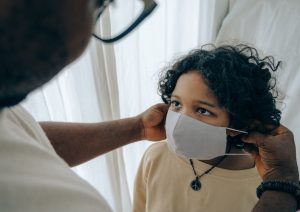Service as Self-Care
 By Kevin Kelly
By Kevin Kelly
As we are now entering what many health experts consider to be the most aggressive phase yet of the COVID-19 pandemic, it is important to return to checking in on ourselves and making sure that we are staying well.
In my role as a teacher for the School District of Philadelphia, I am keenly aware that wellness is a huge challenge to our city right now. We have food insecure students in our community who previously relied on their schools for most of their meals. We have students who live with family members who struggle with addiction. Such students often find the physical space of a school the most comfortable part of their day. We have students who have all but disappeared from our purview, prompting us to call as many possible contacts as we can find so that we can ensure that the student is safe and accounted for.
My wife Mary, a physician, sees many of these same concerns as our Philadelphia community continues to struggle with the physical and economic stresses of life during a pandemic. For workers whose careers are to be in direct service of others, there is a real fear of burnout that stems from the toll that such a crisis can have on our mental health.
This past spring, the Harvard Business Review published an article titled “To Take Care of Others, Start by Taking Care of Yourself.” The article focused on what you might imagine: if you want to serve your community, be sure to take time for self-care, be sure to reach out for help when needed, and stay focused on the positive things in life. In both my work and in Mary’s, there is much lip service about self-care during these uncertain times. We are told to take time for ourselves. We are told to sleep well, prioritize outdoor walks, and practice mindfulness. In reality, we’ve both been working harder than ever serving students and patients, and we seldom find the time for those wellness activities.
But what if the act of the serving others is our self-care? In my encounters with students and Mary’s encounters with patients, we seldom feel that we are not well. To the contrary, our concerns lie with the person in need. In fact, it is in these moments of service that we feel fulfilled, as if in a small way, we can help our community get through this traumatic public health calamity. As Christians, we are called to “use [our gifts] to serve one another as faithful stewards of the many-colored tapestry of God’s grace” (1 Peter 4:10).
None of this is to suggest that educators, healthcare workers, or anybody else whose job brings them into increasingly stressful and traumatic circumstances might not feel unwell. Uncertainty looms large. We do not know when students will go back to school nor whether our neighbors’ businesses will survive this next wave of pandemic-driven economic fallout. We are concerned about our loved ones, particularly our elders. We grieve the months of time spent away from those we hold dear, time that we will never get back. And we mourn the departed.
But it is precisely the desire for the human encounter that allows us to acknowledge the grace inherent in service to others. We know that “our love for others is our grateful response to the love God first demonstrated to us” (1 John 4:19). I think of the early months of the pandemic, when Mary delivered babies for mothers who could not have their partners present for the delivery. In service to her patients, Mary had the opportunity to offer love and companionship in what must have been a lonely time for those women. For Mary, being in those rooms in the middle of the night was to stand with God’s love. There is no greater self-care than that.
I do not intend to misrepresent the point about self-care that the Harvard Business Review was trying to make last spring. We are living through a time unlike any of us has lived before. Nearly all indications suggest that the worst is yet to come. Our community continues to struggle with health challenges, both physical and mental. It is certainly true that we cannot give unto others when our own tanks are exhausted. But among these challenges, we often find meaning—and fulfillment—when we act in service to others. Scripture teaches us that “freedom means that we become so completely free of self-indulgence that we become servants of one another, expressing love in all we do” (Gal 5:13). May we seek such freedom even in the most difficult of times.
This year is many things. It is traumatic. It is busy. It is full of heartbreak. But it is also full of opportunities to serve.
Kevin Kelly and Mary DeAgostino-Kelly are parishioners at Old St. Joseph’s, along with their daughter Sydney and son Nash.
Photo by Ketut Subiyanto for Pexels.
Mass Times
Sunday at 7:30 AM, 9:30AM, 11:30 AM
Tues., Wed., & Thurs. at 12:05 PM
